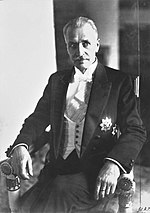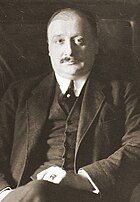
The president of the Council of Ministers, colloquially and commonly referred to as the prime minister, is the head of the cabinet and the head of government of Poland. The responsibilities and traditions of the office stem from the creation of the contemporary Polish state, and the office is defined in the Constitution of Poland. According to the Constitution, the president nominates and appoints the prime minister, who will then propose the composition of the Cabinet. Fourteen days following their appointment, the prime minister must submit a programme outlining the government's agenda to the Sejm, requiring a vote of confidence. Conflicts stemming from both interest and powers have arisen between the offices of President and Prime Minister in the past.

The president of Poland, officially the president of the Republic of Poland, is the head of state of the Republic of Poland. Their rights and obligations are determined in the Constitution of Poland. The president heads the executive branch. In addition, the president has the right to dissolve parliament in certain cases, can veto legislation, represents Poland in the international arena, and is the commander-in-chief.

Stanisław Wojciechowski was a Polish politician and scholar who served as President of Poland between 1922 and 1926, during the Second Polish Republic.

Gabriel Józef Narutowicz was a Polish professor of hydroelectric engineering and politician who served as the first President of Poland from 11 December 1922 until his assassination on 16 December, five days after assuming office. He previously served as the Minister of Public Works from 1920 to 1922 and briefly as Minister of Foreign Affairs in 1922. A renowned engineer and politically independent, Narutowicz was the first elected head of state following Poland's regained sovereignty from partitioning powers.

Kazimierz Władysław Bartel was a Polish mathematician, freemason, scholar, diplomat and politician who served as 15th, 17th and 19th Prime Minister of Poland three times between 1926 and 1930 and the Senator of Poland from 1937 until the outbreak of World War II.
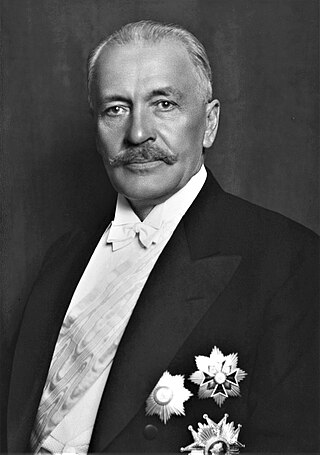
Ignacy Mościcki was a Polish chemist and politician who was the country's president from 1926 to 1939. He was the longest serving president in Polish history. Mościcki was the President of Poland when Germany invaded the country on 1 September 1939 and started World War II.

Wincenty Witos was a Polish statesman, prominent member and leader of the Polish People's Party (PSL), who served three times as the Prime Minister of Poland in the 1920s.

Kazimierz Stanisław Świtalski was a Polish politician, diplomat, soldier, military officer in the Polish Legions and 18th Prime Minister of Poland between April and December 1929.
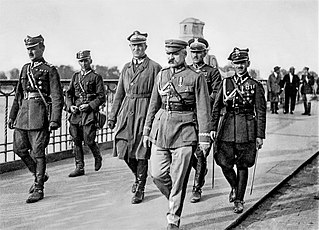
The May Coup was a coup d'état carried out in Poland by Marshal Józef Piłsudski from 12 to 14 May 1926. The attack of Piłsudski's supporters on government forces resulted in an overthrow of the democratically-elected government of President Stanisław Wojciechowski and Prime Minister Wincenty Witos and caused hundreds of fatalities. A new government was installed, headed by Kazimierz Bartel. Ignacy Mościcki became president. Piłsudski remained the dominant politician in Poland until his death in 1935.

Maciej Rataj was a Polish politician, speaker of the Polish Parliament and deputy President of the Republic of Poland, and writer.

Walery Jan Sławek was a Polish politician, freemason, military officer and activist, who in the early 1930s served three times as Prime Minister of Poland. He was one of the closest aides of Polish leader, Józef Piłsudski.
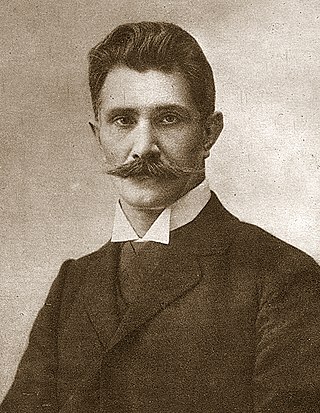
Ignacy Ewaryst Daszyński was a Polish socialist politician, journalist, and very briefly Prime Minister of the Second Polish Republic's first government, formed in Lublin in 1918.
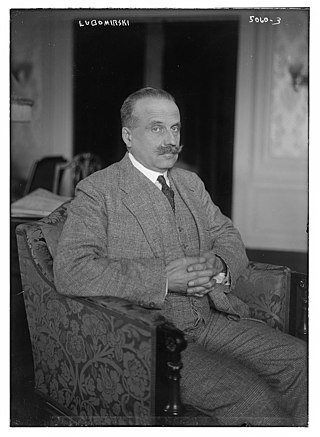
Prince Zdzisław Lubomirski was a Polish aristocrat, landowner, lawyer, a conservative politician and social activist. The Prince was chairman of the "Central Civil Committee" in 1915. From 1916 to 1917 mayor of Warsaw. He was an activist of the "Real Politics Party" and from 1917 to 1918 member of the Regency Council. From 1928 until 1935 member of the Senate and chairman of the "Council of Landowner Organisations" from 1931 to 1935.
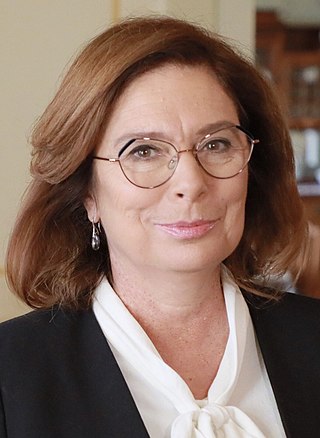
Małgorzata Maria Kidawa-Błońska, née Grabska is a Polish politician, film producer, and sociologist currently serving as Marshal of the Senate. She was Marshal of the Sejm from 25 June 2015 to 11 November 2015 at the end of the Seventh term's composition of the lower house, after which being voted a Deputy Marshal of the Eighth and Ninth term, each time nominated by the opposition party Civic Platform, under the marshalcy of Marek Kuchciński and Elżbieta Witek, respectively.

Związek Ludowo-Narodowy was a Polish political party aligned with the National Democracy political movement during the Second Polish Republic, gathering together right-wing politicians with conservative and nationalist opinions.

Zygmunt Stanisław Marek was a Polish socialist politician.
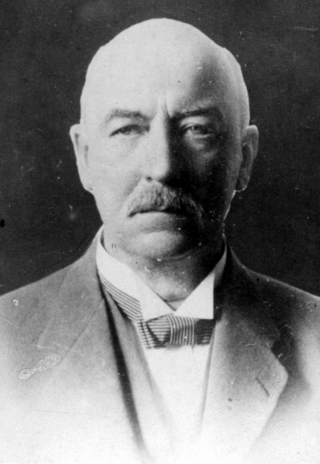
Two indirect presidential elections were held in Poland in December 1922. In the first election on 9 December Gabriel Narutowicz was elected president, but he was assassinated five days later. A second election on 22 December was won by Stanisław Wojciechowski.

The free election of 1587 was the third royal election to be held in the Polish–Lithuanian Commonwealth, which took place after the death of King Stefan Batory. It began on June 30, 1587, when Election Sejm was summoned in the village of Wola near Warsaw, and ended on December 27 of the same year, when King Sigismund III was crowned in Kraków’s Wawel Cathedral.

Maria Wojciechowska, née Kiersnowska, was the First Lady of Poland from 1922 to 1926 as the wife of President Stanisław Wojciechowski.
